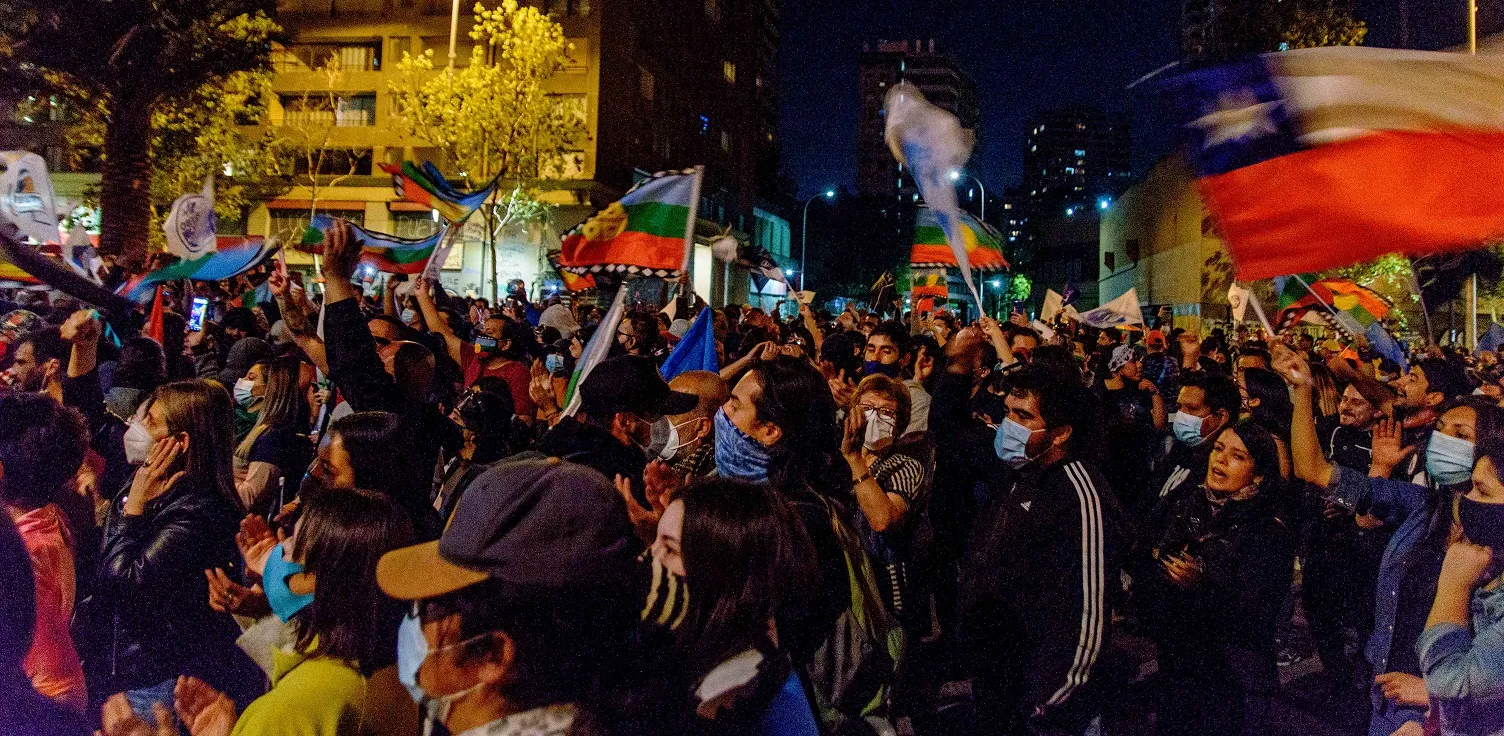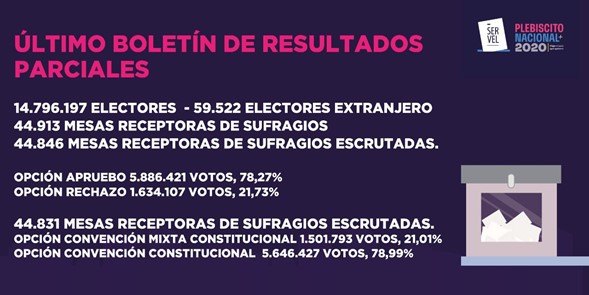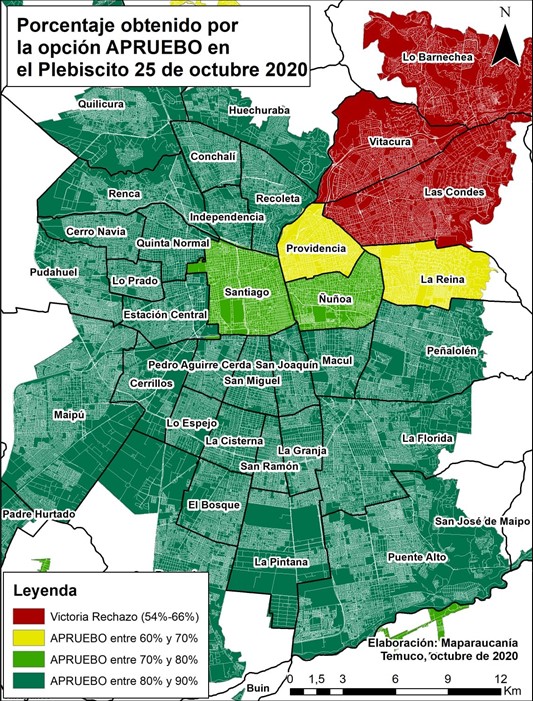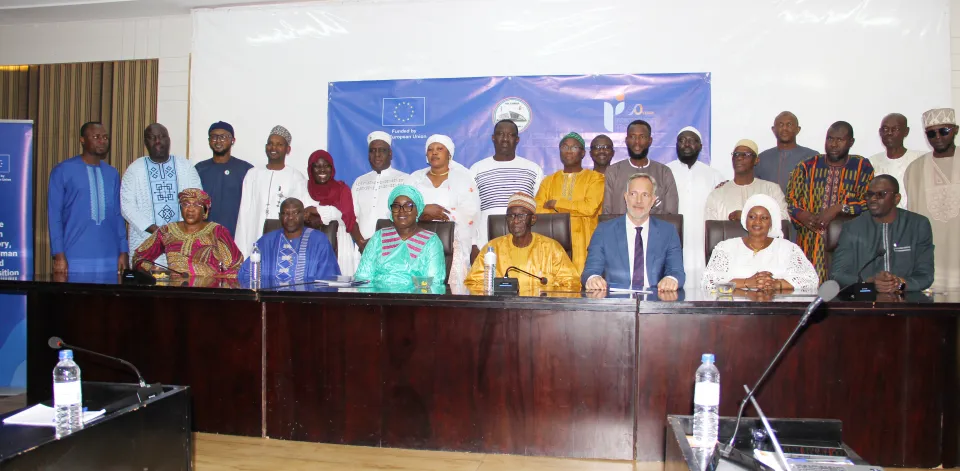National Plebiscite in Chile: Voters approve drawing up a new constitution and that it be done by a Constitutional Convention. What are the next steps?

With an important voter turnout on the National Plebiscite of 25 October, Chileans decided to draw up a new constitution, by the future election of a citizen constitutional convention. What are the next steps for this constitutional process that had just begun?
Disclaimer: Views expressed in this commentary are those of the author. This commentary is independent of specific national or political interests. Views expressed do not necessarily represent the institutional position of International IDEA, its Board of Advisers or its Council of Member States.
Este artículo está disponible en español.
Summary of the results
The constitutional plebiscite held on 25 October was of the utmost importance for Chile. At stake was, first and foremost, burying the 1980 Constitution, which had been drawn up under the dictatorship. Second, it became plain that there is massive citizen support—and influence brought to bear by social organizations—for Chile to embark upon the process of drawing up a new constitution.
How massive was it? With 99.85 per cent of all polling places counted (according to data from the Electoral Service as of 27 October), the figures speak for themselves: In all, 78.27 per cent of the voters cast their ballots for the option of "I approve", meaning approval for drawing up a new constitution; while 21.73 per cent voted for the option "I reject". In addition, society was categorical in expressing the mechanism for coming up with the new constitution: 78.99 per cent voted for a "Constitutional Convention", whereas only 21.01 per cent voted for a "Mixed Constitutional Convention".

Image credit: Servel (26 October 2020).
Even though the data broken down by gender and age group have not been published by the Electoral Service, it is estimated that the participation of young people in this historic election was one of the decisive factors in the 50.9 per cent of participation achieved, the highest since voting became voluntary in Chile in 2012. And this was despite the COVID-19 pandemic and under strict health measures. It is also estimated that the vote of older persons was below average mainly because of caution in the face of possible infection by COVID-19.
With respect to the breakdown by locality (comunas), of a total of 346 localities in Chile, in only five nationwide—three in the Metropolitan Region—did the option of "I reject" win. These were Vitacura (with 66.97 per cent), Lo Barnechea (with 61.43 per cent), and Las Condes (with 55.77 per cent). These are the highest-income localities in the region.

Image credit: Maparaucanía (26 October 2020).
It should also be noted that not only could Chileans vote (both in Chile and abroad); in addition, foreigners who have been living in the country for more than five years and have permanent residence were also able to vote. In this respect, Chile, along with Uruguay, is an exception when it comes to policies regarding voting in national plebiscites in Latin America.
What comes next?
On 11 April 2021, 155 delegates to the Constitutional Convention will be elected directly, by district. The process is analogous to the election of legislators, with one important caveat: Chile will be the only country in the world in which it was determined that the constitutional convention must be elected on a parity basis. The idea is that gender parity among the drafters of the new constitution will help ensure that it embodies a gender perspective. Experts note the Constitutional Convention presents an opportunity for the Chilean State to align with citizen demands and to become a global pioneer in this area. In the same context, the number of members elected by each district will be proportionate to its population.
Who can run for election to the Constitutional Convention?
Citizens who meet the requirements set out at Article 13 of the Constitution may run to serve in the Constitutional Convention, i.e. "Chilean citizens who are at least 18 years of age and who have not been convicted of the most serious criminal offenses".
Public servants who wish to run for election will automatically be terminated from their current positions once they register their candidacy. The Senate is currently considering a bill that seeks to reduce the number of signatures required for independent candidates who run individually (that is, who are not activists in any political party) to register their candidacy from 0.4 per cent to 0.2 per cent (of the number of voters who cast ballots in the previous legislative election), and from 1.5 per cent to 0.5 per cent for independent candidates who organize in groups to run.
In addition, the Senate’s Committee on the Constitution is debating the establishment of an indigenous voter roll (or keeping a single universal one); the definition of who will be able to run as candidates for the constitutional convention; how they will be elected; and the number of seats reserved for each indigenous people or ethnicity. Another matter of debate is the representation for persons with different abilities.
Lists of candidates will be presented which, initially, will bring together representatives of coalitions of political parties (generally grouped into the opposition parties and the governing party and its allies), in addition to the possibility of including representatives of social organizations who agree to participate in those lists, or who decide to run on separate lists. The situation will be similar in the case of independent candidates.
And after the election of the members of the Constitutional Convention?
The election of the delegates to the Constitutional Convention opens the door to a lengthy and complex process. It is estimated that the Convention will begin its work of drafting the new constitution in June 2021, a process that is to take nine months, which may be extended one time only for another three months. In May or June 2022 the new constitution resulting from the convention should be put to a plebiscite for ratification and a national vote, after which the text will be final. If the new constitution is approved, the President of the Republic shall convene the National Congress to promulgate it in a public ceremony. Ten days after this ceremony the new Constitution shall be published in the Official Register (Diario Oficial); it will come into force that same day, thus completing the process of adopting a new Constitution. Even though the results of the 25 October plebiscite were categorical and decisive, it was just the beginning of a long and difficult road towards a new constitution in Chile.



